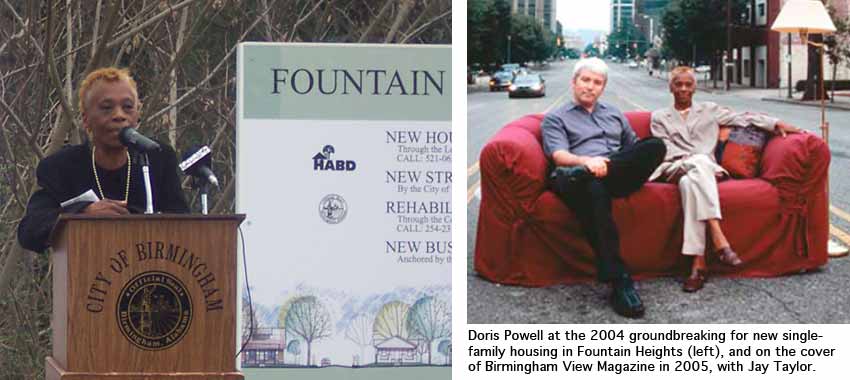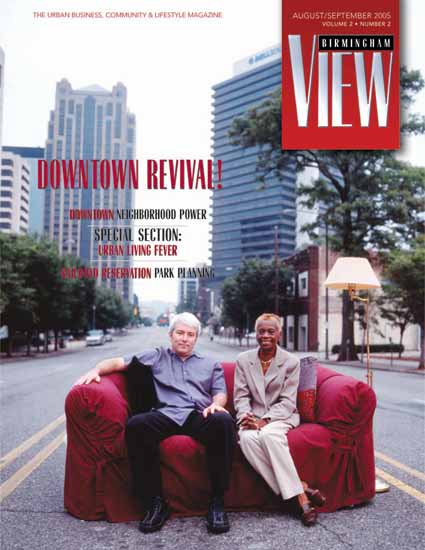|
There’s a hole in the fabric of Birmingham today. Doris Powell, a long-time neighborhood leader and transit advocate, died yesterday.
She died doing what she did best – communing with neighbors who were her constituents and co-leaders of the Northside community. Ms. Powell was among them at the Fountain Heights Neighborhood park when she collapsed and later died.

If you were to look up “community champion” in the dictionary, Doris Powell’s picture would be next to it. Nobody – and I mean nobody – fought harder, worked harder, believed harder, loved harder than Doris Powell when it came to being a tireless advocate and fearless leader of the Fountain Heights Neighborhood Association.
She was a spark plug of pure energy, volatile, sometimes hostile, but never dull or inconsequential, when speaking up for her community. She might have weighed 110 pounds dripping wet, but that wiry little redheaded woman could make much bigger, grown men quiver with anxiety or anger, depending on how they approached an issue that was dear to her heart.
And what was dear to her? Cleaning out drug dealers and criminal behavior. Renovating old houses or building new ones in one of the city’s poorest zip codes. Building a viable public transit system for the people. Upgrading the leaky, dilapidated neighborhood recreation center for children and seniors to enjoy. Actively working with downtown developers on projects south of the I-20/59 overpass that essentially divided Fountain Heights into the haves and the have-nots.
In short, the retiree spent most of her considerable energy generally doing whatever she believed was best to build a community that benefitted all the people in it – from downtown loft dwellers (including me when I lived there) to middle- and low-income homeowners and renters in the hills west of the BJCC.
You see, her territory reached from the traditional residential areas from 16th Street North all the way down to the railroad artery that separates north and south Birmingham, from 19th Street North westward toward I-65.
Because of her tireless campaigning (or constant nagging, depending on which side of the issue you stood), the Birmingham Housing Authority, with assistance from the city and other agencies, built 25 new affordable, single-family houses in Fountain Heights, in area that typical housing developers would likely avoid (you can read my story about the housing groundbreaking here).
As much as she cared for the traditional residents in those hills northwest of Downtown, Ms. Powell was also an advocate for the City Center because half of it was in her neighborhood. Unlike some neighborhood leaders who felt too much attention was paid to Downtown Birmingham at the expense of residential districts, she believed that every dollar spent improving the City Center was a direct benefit to all city neighborhoods.
As such, she was an integral board member of Operation New Birmingham (ONB), which promotes Downtown Birmingham’s growth and development. Her input as a neighborhood leader helped shape the development of major downtown projects, including the FBI/ATF headquarters building and the new Social Security regional administrative office building on the western edge of the downtown core.
Doris Powell served on major boards, including the Birmingham-Jefferson County Transit Authority, where she served as chairwoman for a time. She was also a committee chair on the Metropolitan Planning Organization (MPO) of the Greater Birmingham Regional Planning Commission. Those positions gave her the platforms to push for transit funding and planning, which sadly, still haven’t made much headway.
Ms. Powell’s last day was full of meetings, starting with ONB, the MPO and a stop at the office of her City Council representative, Johnathan Austin. The young councilor was also once a colleague as the president of the Central City Neighborhood Association and a Northside community leader.
He offered to show me share some of the many emails she sent to him, most of them encouraging him, some of them reprimanding him. But all of them, he says, were sent in love, in her passionate quest to serve the interests of the City Center and the residential areas of the Fountain Heights Neighborhood.
“We have lost our chief advocate,” he said this morning, his voice still filled with sadness as he talked about Ms. Powell. “How fitting that she died right in the community she cared so much about. She died doing what she believed in – fighting for the little man.”
I will remember Doris Powell as one of my biggest fans and constant encouragers.
She got up at 6:30 a.m. to watch my interviews on Birmingham View Television. She also caught the public access shows I did for Bright House on Channel 4 years ago. Ms. Powell said I was better than Star Jones, LOL! (Can I use that acronym outside of a text message?) She read the print magazines I produced. She and then Central City neighborhood leader Jay Taylor graced the cover of a 2005 special edition on Downtown Birmingham; it was my best and favorite issue. They sat on a red sofa in the middle of 19th Street. I kept praying the cops wouldn’t come and arrest us during the photo shoot!

She opened every e-newsletter I sent her. She often responded back to let me know how much she enjoyed my writing.
She understood my desire to use my writing skills to promote the positive aspects of the city we both love. My work included much of the work that she was doing – for community development, downtown development, intown transit, housing, job creation, and education.
Doris Powell’s life was woven intricately into the fabric of everything that I wanted to write about, that I wanted to be about, in Birmingham. So her sudden passing yesterday – her being torn away from her neighborhood, her community, her city – has left a hole in Birmingham’s fabric.
It’s left a hole in me too. And it hurts.
vickii
|






